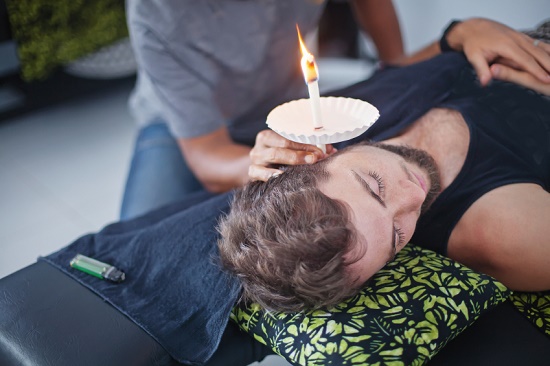
Our ears might possibly be our most mistreated body part. We pierce them, subject them to deafening noise, force cotton swabs inside them, and burn them with ear candling. In spite of supplying us with one of our most important senses, we rarely give our ears, or our hearing, much gratitude or thought.
That is, right until there are problems. After that, we grasp just how crucial healthy hearing really is—and how we should have figured out proper ear care sooner. The secret is to realize this before the damage is done.
If you want to avoid issues and preserve your hearing, stay away from these 4 unsafe practices.
1. Ear Candling
Ear candling is a technique of removing earwax, and also, as one researcher put it, “the triumph of ignorance over science.”
Here’s how ear candling is carried out. One end of a thin tube composed of cotton and beeswax is inserted into the ear. The other end is set on fire, which purportedly creates a vacuum of negative pressure that draws earwax up into the tube.
Except that it doesn’t, for two reasons.
First of all, the ear candle doesn’t create negative pressure. As stated by Lisa M.L. Dryer, MD, earwax is sticky, so even if negative pressure was created, the pressure called for to suck up earwax would end up rupturing the eardrum.
Second, although the wax and ash resemble earwax, no earwax is actually found within the ear candle after the therapy. Clinical psychologist Philip Kaushall tested this by burning some ear candles the traditional way and burning other candles without inserting them into the ear. The residue was exactly the same for both groups.
Ear candling is also harmful and is strongly opposed by both the FDA and the American Academy of Otolaryngology (physicians specializing in the ear, nose, and throat), if you need any other reasons not to do it.
2. Using cotton swabs to clean your ears
We’ve covered this in other articles, but inserting any foreign object into your ear simply drives the earwax against the eardrum, generating an impaction and possibly a ruptured eardrum and hearing loss.
Your earwax is made up of beneficial antibacterial and lubricating properties, and is naturally removed by the regular movements of the jaw (from speaking and chewing). All that’s needed from you is standard showering, or, if you do have issues with excessive earwax, a professional cleaning from your hearing expert.
But don’t take our word for it: just look at the back of the package of any pack of cotton swabs. You’ll discover a warning from the manufacturers themselves advising you to not enter the ear canal with their product.
3. Listening to excessively loud music
Our ears are just not equipped to handle the loud sounds we’ve learned how to generate. In fact, any sound louder than 85 decibels has the potential to create irreversible hearing loss.
How loud is 85 decibels?
A normal conversation registers at about 60, while a rock performance registers at over 100. But here’s the thing about the decibel scale: it’s logarithmic, not linear. That means the leap from 60 to 100 decibels does not make the rock concert twice as loud, it makes it about 16 times as loud!
Likewise, many earbuds can create a similar output of 100 decibels or greater—all from within the ear canal. It’s hardly surprising then that this can produce permanent injury.
If you want to conserve your hearing, make sure to wear earplugs to live shows (and on the job if necessary) and keep your portable music player volume at about 60 percent or less of its max volume (with a 60 minute listening time limit). It may not be cool to wear earplugs to your next concert, but untimely hearing loss is not much cooler.
4. Dismissing the signs of hearing loss
Finally, we have the unsettling fact that individuals have the tendency to wait nearly ten years from the beginning of symptoms before seeking help for their hearing loss.
That indicates two things: 1) people needlessly experience the consequences of hearing loss for 10 years, and 2) they render their hearing loss a great deal harder to treat.
It’s true that hearing aids are not perfect, but it’s also true that with modern technology, hearing aids are extraordinarily effective. The extent of hearing you get back will be based on on the degree of your hearing loss, and seeing as hearing loss tends to become more serious over the years, it’s best to get tested and treated the moment you notice any symptoms.
